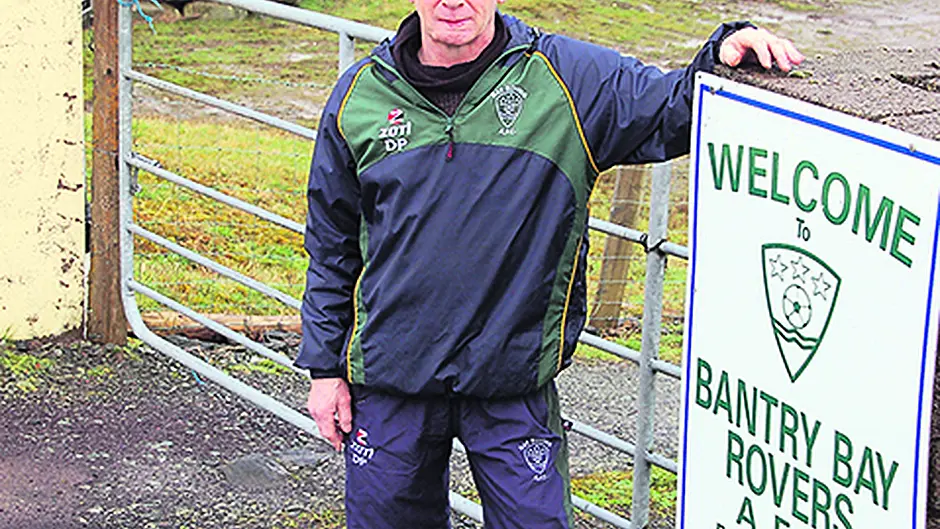Moving to a new calendar season format is the reason West Cork Schoolboys League Chairperson Danny Peters believes 2019 will be one of the most important years in the region's history.
MOVING to a new calendar season format is the reason West Cork Schoolboys League Chairperson Danny Peters believes 2019 will be one of the most important years in the region’s history.
The WCSL has historically been run off between the months of September and May. Climate change, multiple winter postponements and other youth sports stretching to a full calendar year are just some of the reasons the FAI has finalised 2020 as the year every schoolboys league in the country will be held between February and November.
West Cork’s clubs elected to make the switch a year early at their latest AGM and after three pilot schemes in counties Clare, Donegal and Dublin proved hugely successful. In the space of three seasons, each of the aforementioned leagues went from losing player numbers in the first year they made the change to record numbers of children playing football between February and November.
‘All our leagues in the current 2018 mini-season are running along fine and should be finished around the middle or end of February. That is all weather permitting of course,’ WCSL Chairperson Danny Peters said.
‘Then, the West Cork Schoolboys league is hoping to take a two- or three-week break before moving into our new calendar season. The WCSL Committee has decided that we will stick to Saturday’s as our match day for league games during the new campaign. We have done that because we feel that gives us the best chance to avoid any potential clashes with GAA matches.
‘As for the younger age-grades (U7 to U12), the outdoor astro and indoor futsal blitzes will stop for the summer. Those kids play a lot of GAA on Saturday mornings so we will not run those indoor and outdoor blitzes until next September.’
Interestingly, West Cork intends to pilot Saturday as their official match day of choice throughout their new calendar season. An upcoming meeting with the FAI should reveal additional details about what will be involved.
‘Choosing Saturday as our match day was done for a number of reasons, one of them being the availability of referees,’ Bantry Bay Rovers’ Danny Peters said.
‘If we had decided to go with a midweek match day then we would have immediately run into issues with GAA matches. Also, we would have clashed with the West Cork Masters League games on Tuesday and Wednesday nights when our West Cork League referees are needed. The safest option was to stay with Saturdays, as we feel it would cause the least amount of disruption.
‘In terms of age-grades, we hope to maintain our current U12, U13, U14, U15 and U16s in the new calendar season. That depends on how many teams our West Cork Schoolboys League clubs decide to enter.’
The FAI will meet with the WCSL in Cahir where the possibility of taking a month off (or two) to alleviate the pressure on particular age-groups will be on the agenda and how best West Cork can move forward with their new plans.
‘The blueprint for our new season will be confirmed following our meeting with the FAI on January 8th,’ Peters noted.
‘Our WCSL Committee is travelling to Cahir to meet with the FAI on that date. We will decide on the dates we need to keep as free weekends to avoid confirmation, communion and exams at that meeting. We, as a league, want to be fully prepared for when we start our new season.
‘We will also decide if and when we should take time off for our U15 and U16 age-grades as they are particularly busy at certain times of the summer. That might give the league an opportunity to continue our U13 and U14 leagues while the 15 and 16s are on a break, we will just have to wait and see. That would also us to play a smaller number of league games on a particular Saturday and ease the pressure on our referees.’
Unfortunately, it is inevitable that the West Cork Schoolboys League will lose players during the change over to the new calendar season. But the WCSL will gain in the long run. This has already been proven in the three pilot leagues that changed their format over three years ago.
‘Yes, those leagues lost a lot of players in the beginning,’ Peters admitted.
‘Once things settled down, each league reported record playing numbers across all their age-grades. One of the main reasons for that is because playing pitches are in a much better condition during the middle of the year unlike winter when rain and cold temperatures cause havoc with postponements.
‘When we make the move we will have drier pitches and hopefully more people coming to our games. I’m quite sure parents would much prefer to watch our games in sunny rather than wet and windy weather conditions.
‘Another positive option available to us once we move to a February to November timeframe will be the possibility of playing postponed games within seven days of being called off. That’s something that’s just not possible in the winter because it gets dark at four o’clock and so few of our grounds have floodlights.’
Registration of all players is also moving to a new online website hosted by the FAI. In the coming years, clubs will be responsible for inputting their players’ information and in the correct age group. The same rules apply as previous seasons when it comes to determining a player’s grade.










